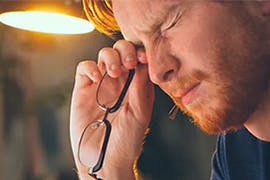TRAVELING? HERE’S HOW TO AVOID MIGRAINE TRIGGERS
A few simple steps can help make your next flight less painful.
LUCY MAHER
When you’re planning for air travel, you can expect to run into long lines at check-in, starchy airplane food and cranky seatmates.
So the last thing you need is a migraine.
But that’s exactly what some travelers may experience. That’s because some migraine triggers —including lack of sleep, dehydration and stress — can abound when you step foot in the airport or on the plane, especially during peak travel times over the holidays.
The good news: You don’t have to suffer if you follow a few key strategies.
Avoid Dehydration
Ever felt that the air on planes is very dry? You’re not imagining things. At the end of long-distance flights, the humidity inside the aircraft can be as low as 2 to 3% (compare that to a “comfortable” humidity of 40 to 70%). 1 Low humidity can make your lips feel dry, or even your nose, eyes, mouth and throat. So it’s not a bad idea to stay hydrated — especially because migraine sufferers can be more sensitive to dehydration. Keep your body hydrated with copious amounts of water before and during your flight, and lay off the alcohol and caffeine, both diuretics, which can exacerbate your symptoms.
Get Some Sleep
Sleeplessness can trigger both headaches and migraines in some people. In fact, a recent large study of migraine sufferers found that 50% cited sleep disturbances as a migraine trigger. Those who received less than six hours of sleep a night on average had more frequent and more severe headaches than those who slept more. 2
Getting shut-eye on a long-haul flight is easier said than done, with flight attendants passing food and drink down the aisle, crying babies, and the rumble of the jet engine. Your best bet is to invest in a pair of earplugs, an eye mask and a comfortable neck pillow and aim for as sound a sleep as you can muster (another tip: keep your hands and feet warm). If you’re taking a red-eye, book as late a flight as possible so your body can stay on a sleep schedule.
Eat Properly
Ever leave your favorite restaurant with a splitting headache? Could be because you ate something loaded with tyramine, a naturally produced compound found in protein-containing foods, which can trigger migraines in some people.
Examples of foods that contain tyramine are many, including some aged cheeses; dried, smoked or picked meats or fish; and fermented soy products like soy and teriyaki sauce.
Nuts and wine, typically offered on planes, also contain this compound. A good rule of thumb: Stick to on-board options like pretzels, grab a yogurt or dried fruit on your way to the gate, or bring your own snacks, like air-popped popcorn.
Avoid Stressful Situations (When You Can!)
It’s no secret stress contributes to headaches. In fact, a study revealed that for every 10 percent increase in subjects’ stress levels, they experienced migraine headaches 4.3 percent more days/month.
The bad news? You can’t really control the stress-inducing things that happen while traveling, like flight delays and cancellations. But using common sense can help you avoid the worst of the stressors: Arrive early to avoid long lines and crowded security lines, double-check the weight of your luggage before leaving home to avoid baggage fees, and put your airline customer service number on speed dial so you can be ready should that cancellation come through. If you do find yourself super stressed out, try to find a quiet place to do some relaxation techniques, like meditation.
Following a few strategies for air travel can help you stay migraine-free — so you can hit the ground running when you get to your destination. For more tips, see the Ultimate Migraine Survival Kit.
See a doctor for diagnosis of migraines and migraine relief options.
References:
- H. Hinninghofen , P. Enck. Passenger well-being in airplanes. Autonomic Neuroscience: Basic and Clinical 129 (2006) 80–85
- Kelman L, Rains JC. Headache and sleep: examination of sleep patterns and complaints in a large clinical sample of migraineurs. Headache. 2005 Jul-Aug;45(7):904-10. http://www.ncbi.nlm.nih.gov/pubmed/15985108
References: migraine tips, migraine prevention, holiday








